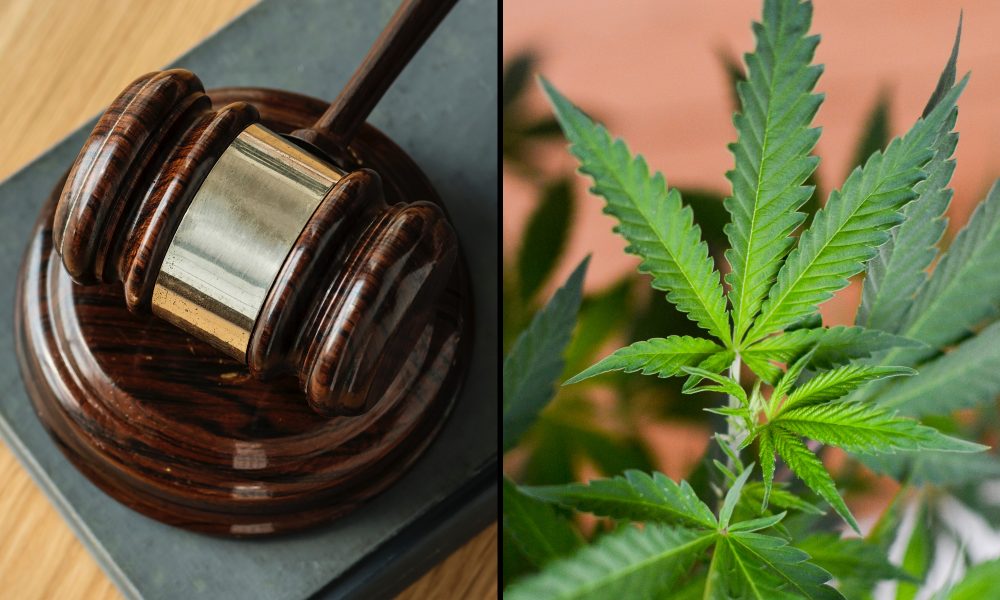The federal U.S. Sentencing Commission (USSC) has approved an amendment to update sentencing guidelines advising judges to treat prior marijuana possession offenses more leniently.
At a public meeting on Wednesday, members of the commission voted to promulgate a series of amendments to existing guidelines, including a multi-part criminal history revision that adds cannabis possession as an example of an offense that generally warrants sentencing discretion.
As it stands, federal judges are directed to take into account prior convictions, including state-level cannabis offenses, as aggravating factors when making sentencing decisions in new cases. But as more states have moved to legalize marijuana, advocates have pushed for updated guidelines to make it so a person’s marijuana record doesn’t add criminal history points that could lead to enhanced sentences.
There wasn’t discussion of the cannabis amendment at Wednesday’s meeting beyond a brief description, and it was approved on a voice vote. The revised guidance will now be sent to Congress by May 1. If lawmakers don’t contest the amendment, the change will be finalized effective November 1.
Last month, the Justice Department testified in support of the amendment at a USSC public hearing.
The proposal doesn’t seek to remove marijuana convictions as a criminal history factor entirely, but it would revise commentary within the guidelines to “include sentences resulting from possession of marihuana offenses as an example of when a downward departure from the defendant’s criminal history may be warranted,” according to a synopsis.
“While marihuana remains a Schedule I controlled substance under the federal Controlled Substances Act (CSA), subjecting offenders to up to one year in prison (and up to two or three years in prison for repeat offenders), many states and territories have reduced or eliminated the penalties for possessing small quantities of marihuana for personal use,” it notes.
The term “downward departure” refers to situations where federal judges impose sentences that are lower than the minimum recommended under current guidelines. In essence, the amendment would codify that simple cannabis possession, “without an intent to sell or distribute it to another person,” is a prime example of a case that should warrant sentencing discretion.
Here’s the newly adopted commentary language on cannabis possession for the sentencing guidelines:
Downward Departures.— (A) Examples.—A downward departure from the defendant’s criminal history category may be warranted based on any of the following circumstances:
…
(ii) The defendant received criminal history points from a sentence for possession of marihuana for personal use, without an intent to sell or distribute it to another person.
Under the commentary of the current guidelines on downward departures, there’s no explicit reference to cannabis. USSC gives one example of a case that could warrant a sentencing classification reduction if “the defendant had two minor misdemeanor convictions close to ten years prior to the instant offense and no other evidence of prior criminal behavior in the intervening period.”
Criminal history is one of two main factors that judges are encouraged to use to determine a person’s sentence. There are six levels of criminal history, and the higher the level, the more severe the sentence is supposed to be.
USSC released a report in January showing that hundreds of people received more serious federal prison sentences in the last fiscal year because of prior cannabis possession convictions in states that have since reformed their marijuana laws.
While federal marijuana possession cases have declined dramatically since 2014 as more state legalization laws have come online, the report highlighted the long-term consequences of cannabis convictions in terms of federal sentencing.
USSC first said in October that it was looking into revising its guidelines to change how marijuana possession convictions should affect a person’s criminal history calculation (CHC) in sentencing decisions.
The body then issued proposed language and collected public comment, but didn’t end up changing the marijuana section in response to submitted feedback.
—
Marijuana Moment is tracking more than 1,000 cannabis, psychedelics and drug policy bills in state legislatures and Congress this year. Patreon supporters pledging at least $25/month get access to our interactive maps, charts and hearing calendar so they don’t miss any developments.
Learn more about our marijuana bill tracker and become a supporter on Patreon to get access.
—
While federal drug cases are prevalent in the U.S. criminal legal system, marijuana-related convictions have been on the decline as more states have moved to legalize cannabis and prosecutorial priorities have shifted.
The commission released report last month that found that federal marijuana trafficking cases continued to decline in 2022.
Federal data from Customs and Border Protection (CBP) that was released in January shows that cannabis seizures fell to a record low in Fiscal Year 2022, continuing an enforcement trend that advocates attribute to the state-level legalization movement.
A report from the Government Accountability Office (GAO) that was released last year also paints a clearer picture of who is getting caught up in its enforcement activities. At checkpoints across the country, agents are mostly taking small amounts of marijuana from American citizens, rather than making large busts of international cartels like some might assume.
Also, consistent with other studies and federal reports, the analysis revealed a significant decline in cannabis seizures at checkpoints overall since 2016. In 2016, there were 70,058 pounds of marijuana seized at checkpoints by Border Patrol, compared to 30,828 pounds in 2020.
Separately, in the U.S. Senate, bipartisan members recently filed bills to lower mandatory minimum sentences for people with non-violent federal drug convictions and protect those facing such charges from having to undergo automatic pre-trial detention.
Arkansas House Passes Bill To Protect Medical Marijuana Patients’ Rights To Carry Concealed Guns
Photo elements courtesy of rawpixel and Philip Steffan.
Read the full article here


